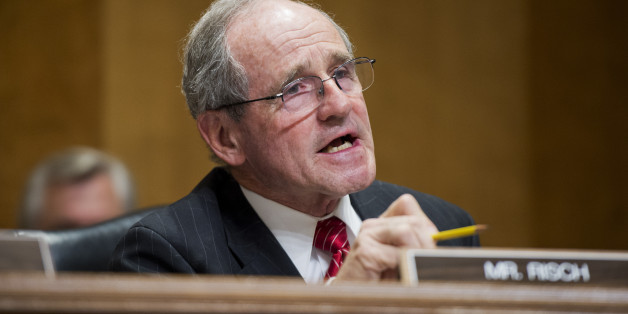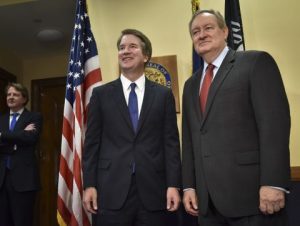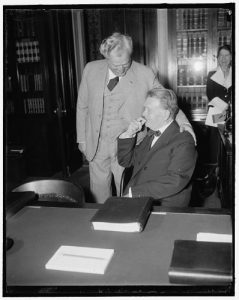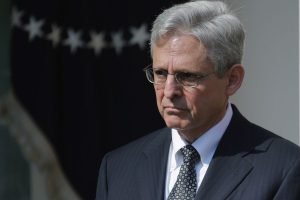 As Court Showdown Looms, an Anniversary of Note
As Court Showdown Looms, an Anniversary of Note
Two years ago in his State of the Union address, Barack Obama called out the Supreme Court of the United States for its ruling in the Citizens United case involving campaign financing.
With most members of the Roberts Court looking on from their seats in the well of the House of Representatives, Obama told the country that the Court had “reversed a century of law to open the floodgates for special interests—including foreign corporations—to spend without limit in our elections.”
With perhaps the exception of his reference to “foreign corporations” – it’s hard to tell the source of much of the new money flooding campaigns – Obama explained exactly what has happened in the subsequent two years. And predictably, the president was roundly criticized in the aftermath of the speech for an “unprecedented attack on the Court. Justice Samuel Alito, one of the five judges in the majority in Citizens, could be seen mouthing the words “not true.”
In retrospect, not only was the president right on the substance of his criticism of the Court – Obama did teach at one of the country’s great law schools – but he had the guts to deliver his critique right to the faces of those in the black robes who hold so much sway over the policy and priorities of American life. It was hardly an unprecedented attack, either, particularly in the context of an anniversary of, what I would argue, was a defining moment in the evolution of the modern U.S. Supreme Court.
Just over 75 years ago – February 5, 1937 to be precise – the president to whom Obama is so often compared and contrasted, Franklin D. Roosevelt, took a decidedly different tack with the high court he took issue with. FDR didn’t just criticize the justices, although he certainly did criticize, he attempted – and came reasonably close to succeeding – to fundamentally remaking the Court in his more liberal image. Roosevelt’s “court packing scheme,” as it quickly became known, turned out to be his greatest single blunder as president. It also presented the country with the greatest Constitutional crisis since the Civil War.
Now, with the Supreme Court poised to hear, in unusual detail, the arguments for and against Obama’s health insurance reform initiative – the Affordable Care Act – it’s worth reflecting on the history of the court over the last 75 years and considering what might have been and what has become.
The normally surefooted Franklin Roosevelt made misstep after misstep with his plan to enlarge the Court in 1937 and when his efforts at a judicial power grab finally ended he reaped the political whirlwind. Never before, after the court packing fiasco, would Roosevelt command a working majority in the Congress for his domestic agenda. With one ill-considered move, FDR squandered his massive 1936 re-election mandate – Democrats held 76 seats in the Senate after that election – he shattered the myth that he was politically invincible and, it seems, Roosevelt forever took off the policy table any effort by any president to “reform” the nation’s highest court.
Roosevelt’s tools in attempting to enlarge the Court were secrecy and subterfuge and each got him in trouble. With the encouragement of his Attorney General, Homer Cummings, FDR hatched a secret scheme to add one additional justice to the Supreme Court for each justice over 70 who refused to retire. He consulted with no one on the idea except his politically tone deaf attorney general and then sprung the idea on unsuspecting Congressional allies. They were first stunned and then outraged.
Roosevelt compounded his “born in secrecy” problem by dissembling about the real reasons behind his proposal. Clearly he wanted to liberalize a court that had come to be dominated by former corporate lawyers and Republican appointees, but he let Cummings peddle the fiction that he was trying to improve the Court’s efficiency. The “nine old men” on the Court had fallen behind in their work, it was alleged. That argument never gained traction and simply wasn’t true.
Had Congress adopted his audacious idea, Roosevelt could have immediately added six new justices to the Supreme Court, as well as a slew of other federal judges. The Supreme Court would have gone from nine members to 15 and, of course, the president would have the chance to appoint justices who held out the prospect of liberalizing the Court that had shot down so many of Roosevelt’s New Deal initiatives.
[On one particularly Black Monday in May 1935, the Court struck down three important New Deal initiatives, including much of the centerpiece of Roosvelt’s domestic agenda – the National Industrial Recovery Act.]
In a rare rebuff for Roosevelt, the Congress simply wouldn’t buy his court packing. Republicans, of course, rebelled, but so did many Democrats. Montana liberal Burton K. Wheeler, a fierce foe of concentrated power in government or the economy, was chosen to lead the Senate opponents of FDR. Ironically, Wheeler had been among the very first to encourage Roosevelt to seek the presidency having publicly done so in 1930. By 1937 Wheeler had enough of what he saw as Roosevelt’s accumulation of personal power and made common cause with Republicans like Idaho’s William E. Borah and Oregon’s Charles L. McNary to battle the president.
As the battle was fully joined in the summer of 1937, Wheeler collaborated with Justice Louis Brandeis, ironically the greatest liberal on the Court, to obtain a letter from the patrician Chief Justice Charles Evans Hughes. Hughes’ letter, quickly drafted over the weekend prior to Wheeler’s Senate committee testimony, completely demolished FDR”s argument that the Court was behind in its work.
Borah further complicated Roosevelt’s plans when he prevailed upon his neighbor, Justice Willis Van Devanter, one of the most conservative members of the Court, to strategically announce his retirement to coincide with the release of the Hughes letter. The combination was a classic political one-two punch, but Roosevelt still refused to compromise or fold.
The American Bar Association opposed Roosevelt, as did most of the nation’s editorial pages. Still, through the hot summer of 1937, Roosevelt soldiered on with his proposal, driving an ever deeper wedge into the Democratic Party. Roosevelt was offered a compromise. If he backed off, one or two additional members of the Court would quickly retire and he could have his more liberal appointees. He refused. Seeking another route to compromise, some senators suggested the president might get two or three new seats rather than six. He refused.
Even the 10-8 vote in the Senate Judiciary Committee against the president’s bill – the committee was dominated, of course, by Democrats – failed to move the president. Incidentally, Borah wrote much of the committee report; a report that has been characterized as one of the harshest denouncements of a presidential initiative in the history of the Senate.
Ultimately, it took a dramatic Senate tragedy to bring an end to Franklin Roosevelt’s biggest blunder. FDR’s loyal lieutenant, Senate Majority Leader Joseph T. Robinson of Arkansas, while no fan of the court packing plan, still believed that loyalty to “the boss” demanded that he try to get something passed in the Senate. Robinson worked himself into a lather debating the court bill and managing the president’s expectations and in the stifling mid-July heat in Washington – the days before central air conditioning – the Majority Leader grew red in the face, announced he was done for the day and stormed off the Senate floor.
Senator Royal Copeland of New York, a physician, had warned Robinson that he was working too hard and that no bill was worth killing himself over. Robinson retreated to his apartment close to the Supreme Court building to rest. On the morning of July 14, 1937, his maid found the gruff, but much respected and well-liked Senate leader, dressed in his pajamas and slumped on his bathroom floor. Robinson was dead of heart attack. Nearby he had dropped his copy of the Congressional Record. Robinson had been reading the debate over the court bill.
Joe T’s death stunned the Capitol, in part because it was an open secret that FDR had promised the loyal Robinson the first vacancy on the Court, even though as a conservative southern Democrat Robinson was unlikely to become a liberalizing force on the Court. Senators took to calling Robinson, Mr. Justice, as they anticipated that any day FDR would name Joe to the high court.
Roosevelt hesitated. Had he made that appointment it might well have paved the way for a compromise on the court bill, or at least presented the president with a face saving exit strategy. But Roosevelt took no action and, with Robinson dead, hard feelings toward the president grew even worse in the Senate. Wheeler even went so far as to claim God himself seemed opposed to packing the court.
On the train that carried most of Robinson’s colleagues back from his funeral in Little Rock, Vice President John Nance Garner counted noses for the White House. When ol’ Cactus Jack arrived back in Washington he went directly to see Roosevelt and told him that he was beaten. The Senate when it voted, Garner said, would defeat Roosevelt’s plan to expand the Court. FDR was stunned. He continued until that moment to think that he could work his will on the Congress as he had so many times before. He reluctantly asked Garner to negotiate the best exit possible.
Garner went to Wheeler’s office in what is now the Russell Senate Office Building and told the Montanan that he “could write his own ticket” with regard to the court bill. As legend has it, the two old pols had a drink of bourbon and decided that the bill would be recommitted to the Judiciary Committee, in effect killing the proposal. Seventy senators eventually voted to recommit the court bill and Roosevelt had lost an epic battle over the Supreme Court. The whole contest had lasted for a mean 168 days.
Had FDR been willing to compromise, even a little, he might have modestly enlarged the Supreme Court in 1937 and we can only speculate as to what the long-term impact of that political act might have been. It seems safe to conclude that had a political compromise over the makeup of the Court occurred we would think somewhat differently about the Supreme Court today.
Roosevelt would later argue that he lost a battle over the Court, but eventually won a war and there is truth in that statement. Alabama Sen. Hugo Black was soon appointed to fill Van Devanter’s seat. Black, it was widely noted, had supported the court packing legislation and opposed the vote to recommit in the Senate. Black turned out to be one of the Court’s great liberals and a staunch defender of civil liberties. In time, Roosevelt also appointed Justices like William O. Douglas and Felix Frankfurter, who helped define American jurisprudence until the time of the Ford Administration.
Perhaps in an even more important way, Roosevelt’s efforts to expand the Supreme Court 75 years ago removed any possibility that any president could realistically hope to change the court simply because he disagreed with its rulings. It’s unthinkable today that a Roosevelt-like idea could be seriously considered. Instead, the fights over the direction and role of the Supreme Court are fought out each and ever time a president nominates a new justice. These confirmation fights, increasingly nasty and partisan, are still no where near as nasty as the 75 year ago fight over whether the Supreme Court would be fundamentally changed.
The great historian William Leuchtenberg has written: “FDR’s [court proposal] generated an intensity of response unmatched by any legislative controversy of this century, except possibly the fight over joining the League of Nations. Southern Democrats feared that an expanded liberal Court would give rights to blacks; progressives saw an assault on the branch responsible for protecting civil liberties; moderates who had always mistrusted Roosevelt now had proof of his treachery.”
It wasn’t as if Roosevelt hadn’t been warned. At one point Wheeler told the president that with many Americans the “Supreme Court is a religion,” and, Wheeler said, it is never smart to get in the middle of a religious fight.
This much seems certain, when the current Supreme Court issues its decision on the health insurance reform law later this summer there will, no matter how the decision goes, both glee and gloom. Still, when the smoke clears, the country, the Congress and the president will accept the verdict of the Court. Some folks, grumbling all the way, will not like the verdict, but just like the controversial decision that ended the 2000 election – Bush v. Gore – we’ll grumble and move on.
We don’t always like what we hear from the pulpit at church, but Burt Wheeler had it right in 1937. The Court may not always be right, but we accept the higher authority nevertheless.
In a way, we can thank Franklin Roosevelt and his furious fight exactly 75 years ago for that now enduring feature of American political life.


















